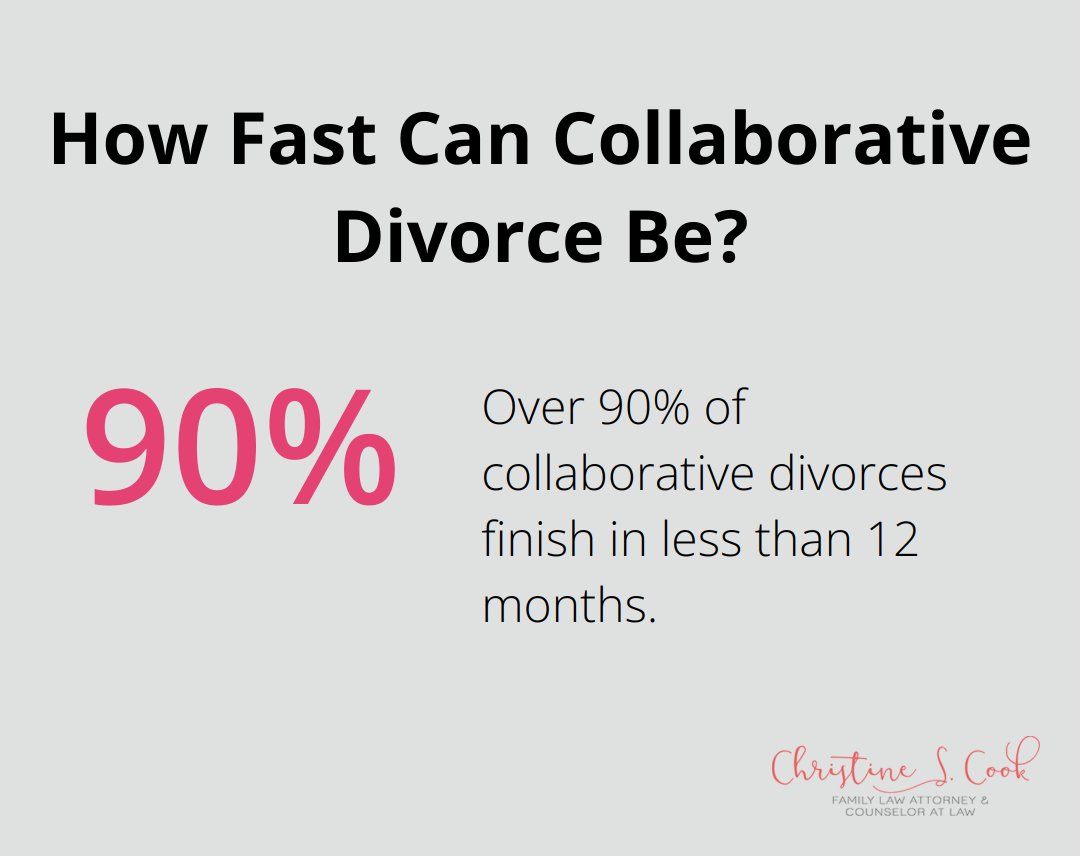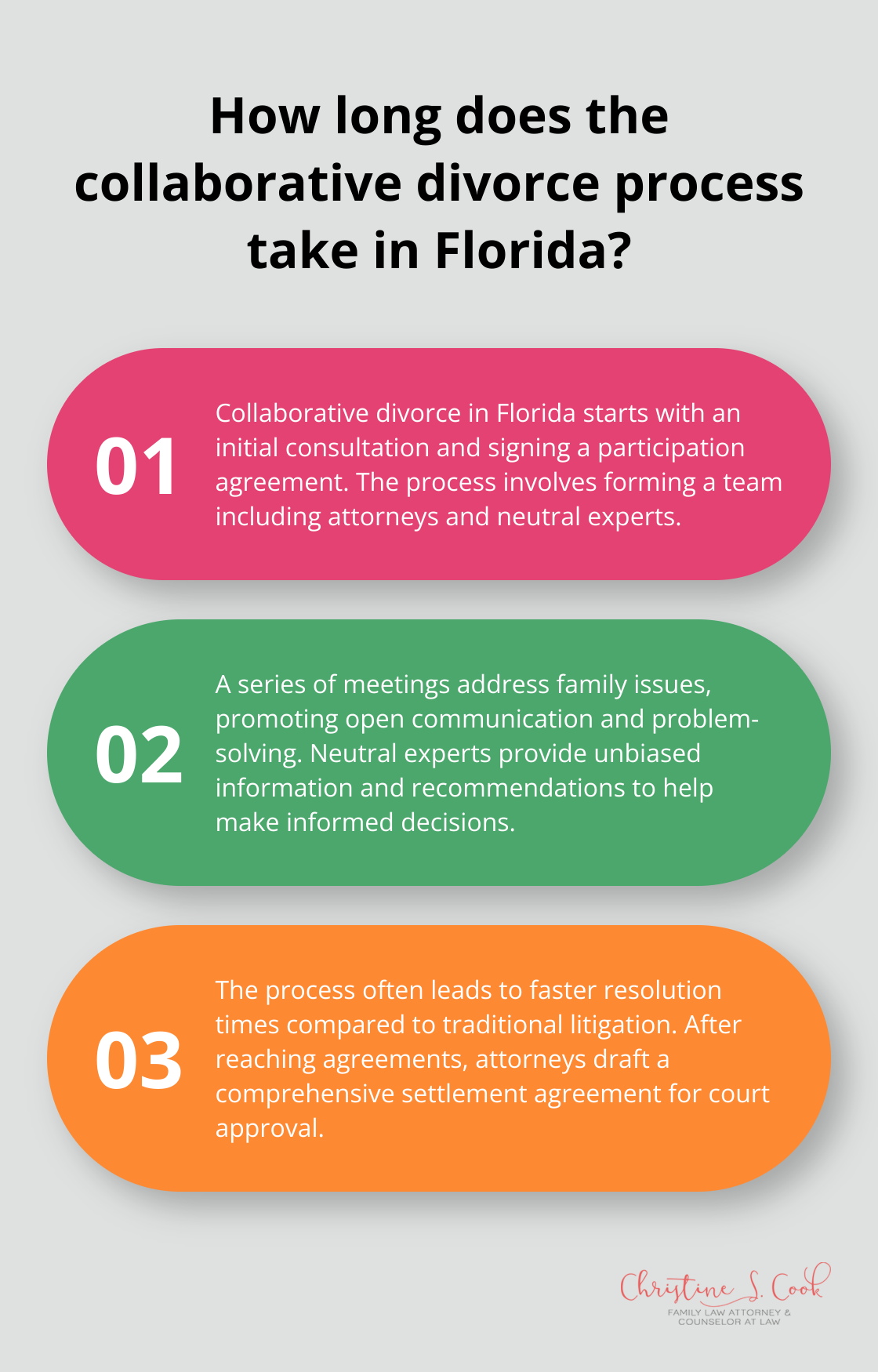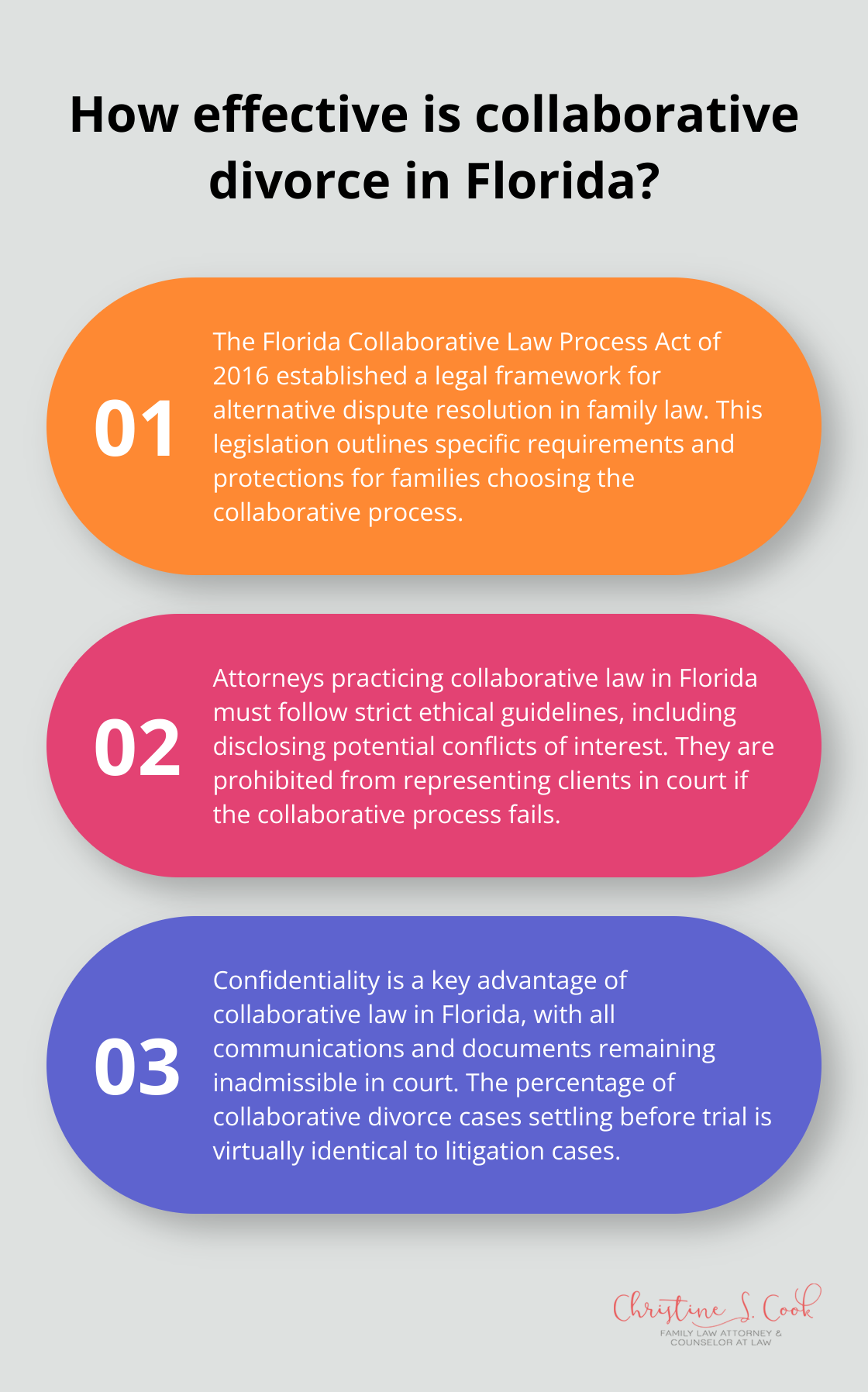At Christine Sue Cook, LLC, we understand that family disputes can be challenging. That’s why we’re excited to explore Collaborative Family Law in Florida as an alternative to traditional litigation.
This approach offers families a more cooperative and less adversarial way to resolve conflicts. In this post, we’ll dive into the key aspects of collaborative family law in Florida and how it can benefit you and your loved ones.
Collaborative family law represents a groundbreaking method for resolving family conflicts in Florida. This approach emphasizes cooperation over confrontation. Families collaborate with their attorneys and other professionals to achieve mutually beneficial solutions without court intervention.
In collaborative law, each party retains their own attorney. However, unlike traditional litigation, these lawyers commit to finding common ground. The process often incorporates neutral experts (such as financial advisors and child specialists). This team-based strategy ensures a comprehensive consideration of all aspects of a family’s situation.
A primary advantage of collaborative family law lies in its focus on relationship preservation. This aspect proves particularly crucial when children are involved. By sidestepping the adversarial nature of court battles, families can sustain respect and open communication.
Over 90% of collaborative divorces finish in less than 12 months, while the average litigated divorce takes about 18 months. This efficiency not only saves time but also minimizes the emotional toll on families.
Collaborative law often proves more cost-effective than traditional litigation. These figures typically fall below the expenses associated with protracted court battles.
Experienced collaborative law attorneys play a pivotal role in guiding families through this process. They facilitate open communication, help identify common interests, and work towards creative solutions that benefit all parties involved. Their expertise proves invaluable in navigating the complexities of family law while maintaining a cooperative environment.

As we move forward, we’ll explore the specific steps involved in the collaborative family law process in Florida, shedding light on how families can effectively utilize this approach to resolve their disputes.
The collaborative law process in Florida starts with an initial consultation. Both parties meet their respective attorneys to discuss the concept, assess its suitability, and understand potential benefits and challenges. If you choose to proceed, you sign a participation agreement. This document commits you to the collaborative process and prevents litigation.

The next step involves the formation of your collaborative team. This team typically includes you, your spouse, your respective attorneys, and neutral experts as needed. These experts may include financial advisors, child specialists, or mental health professionals (depending on your specific circumstances).
Once the team assembles, a series of meetings address your family’s unique issues. These sessions promote open communication and creative problem-solving. Unlike adversarial court proceedings, collaborative meetings encourage both parties to express their needs and concerns freely.
During these meetings, issues receive systematic attention. For instance, if property division concerns you, a financial neutral might provide an objective analysis of your assets and debts. This expert can help develop equitable distribution plans that consider both parties’ financial futures.
Neutral experts play a pivotal role in the collaborative process. They provide unbiased information and recommendations, which help both parties make informed decisions. For example, a child specialist can offer insights into your children’s needs and help develop a parenting plan that prioritizes their well-being.
These experts can significantly streamline the process. The collaborative process often leads to faster resolution times compared to traditional litigation.
As you reach agreements on various issues, your attorneys draft a comprehensive settlement agreement. This document outlines all the terms you’ve agreed upon (from asset division to parenting schedules). You’ll have the opportunity to review and refine this agreement until it accurately reflects your mutual decisions.
Once both parties express satisfaction with the agreement, it goes to the court for approval. In most cases, this process proceeds smoothly, as the court generally respects agreements reached through collaborative divorce. After court approval, your agreement becomes a binding legal document.
The collaborative process often leads to more satisfying and durable outcomes for families. It focuses on cooperation and mutual problem-solving, which helps preserve relationships and sets a positive tone for future interactions. This approach proves especially beneficial when children are involved.
As we move forward, we’ll explore the legal requirements and considerations specific to collaborative family law in Florida, providing you with a comprehensive understanding of this process.
The Florida Collaborative Law Process Act of 2016 establishes a robust foundation for alternative dispute resolution in family law. This legislation outlines specific requirements and protections for families who choose the collaborative process. It provides a clear legal structure that supports cooperative problem-solving outside of traditional court proceedings. The collaborative process is beginning to be used to help parties resolve their differences in disputes outside of the family arena as well.
Florida attorneys who practice collaborative law must follow strict ethical guidelines. These rules ensure that lawyers maintain transparency and prioritize the collaborative process throughout. Attorneys must disclose any potential conflicts of interest to their clients. Additionally, they cannot represent their clients in court if the collaborative process fails. This requirement motivates all parties to work diligently towards a resolution.
One of the most significant advantages of collaborative law in Florida is its strong confidentiality protections. All communications, negotiations, and documents produced during the collaborative process remain confidential and inadmissible in court. This protection allows families to discuss sensitive issues openly without fear of future repercussions. The Florida Bar notes that these confidentiality measures lead to more honest and productive negotiations in collaborative cases.
While collaborative law aims to avoid litigation, sometimes it becomes necessary. In Florida, if the collaborative process fails, both parties must hire new attorneys for court proceedings. This requirement serves as a powerful motivator to resolve disputes collaboratively. Statistical analysis of collaborative divorce in Florida shows that the percentage of cases that settle before trial is virtually identical to the percentage of litigation cases that settle before trial.
The collaborative divorce process often results in more satisfactory outcomes than traditional litigation. It can save time, money, and emotional stress for Florida families. The process allows for creative solutions tailored to each family’s unique needs. It also helps preserve relationships, which proves especially beneficial when children are involved.

Collaborative family law in Florida offers a transformative approach to resolving family disputes. This process empowers families to work together, fosters open communication, and maintains mutual respect. Families often find that this approach saves time and money compared to lengthy court battles.

The involvement of neutral experts ensures that all aspects of a family’s situation receive thorough consideration, leading to more comprehensive and tailored solutions. Choosing an experienced collaborative law attorney is essential to navigate this process successfully. These professionals guide families through negotiations, facilitate productive discussions, and help craft creative solutions that meet everyone’s needs.
We encourage Florida families facing legal disputes to explore collaborative options. This approach addresses immediate concerns and sets a foundation for positive future interactions. At Christine Sue Cook, LLC, we specialize in collaborative family law (offering expert guidance and compassionate support throughout the process).
